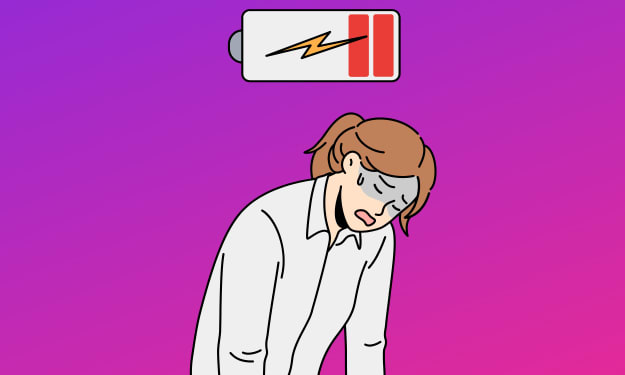The 10 Worst Things You Can Do To Someone Having A Hard Time
And how your actions can make their issues worse.

I had a hard time not that long ago. I, probably like you or someone you know, faced a health crisis. And after the doctor's strong directions, I had a recovery battle on my hands.
For me, my liver was in trouble, a flow-on effect of losing my gallbladder. My specialist warned of impending issues if I didn't heal my liver. The way to do that?
Lose weight. A lot of it. Easier said than done, right?
This wasn't like any old weight loss before. It was a moment in my life when my health was truly under threat, and losing weight was to save my life.
I was going through it; mentally and physically. Finding out this news was hard, challenging, and downright devastating. And the work I had to put in to lose the weight when I was already unwell and physically detached from my body, challenged everything I had.
I look back on it and think about what I wanted and needed from my loved ones during this time.
Let's face it; I couldn't get through this alone. You can't survive tough times completely without help.
What people going through any hard time in their life need from their loved ones is often simple yet overly complicated all at the same time.
As someone who wants others to get the support I did, here are the things not to do with your suffering loved one.
---
Throughout this piece, I'm going to use my situation as an example. But in reality, there are many, too many examples of people going through it. I would be happy to apply these tips to any situation you're wondering about, and explain how they would apply to other circumstances. Let me know!
1. Forgetting about solidarity
When someone is going through a tough time, they feel alone. Whether they're surrounded by a million people every single day, loneliness takes over them.
With such loneliness, it doesn't help when people in your life don't even entertain solidarity with you.
They don't offer to go on the journey with you; they don't offer to exercise with you, in my situation for example. They don't offer to make sacrifices with you. They leave it all to you.
It's not that the person suffering needs solidarity to get better. They know they're the only ones who can truly improve the situation they're in. In my example, I was the one who had to count calories, exercise, and sacrifice, not anyone else.
Yet solidarity, and even the offer thereof, helps make everything a little easier. And anti-solidarity only makes the situation worse.
2. Say one thing and do the opposite
When people are going through a challenge, they need the rest of the people in their life to act dependable. And to exercise reliability when around them.
But more so, they need others to avoid "saying one thing and doing the opposite".
For example, you can't tell an alcoholic to quit drinking and then get drunk in front of them the next day. Or take them to a winery and make them carry your wine to the car for you.
Saying one thing and doing another shows your lack of empathy.
You don't understand how torturous your behaviour is. It's like you're purposefully rubbing their nose in the situation. If you cared, you wouldn't do that, right?
It also makes you a hypocrite. You can't come down on someone and ask them to do something you're not willing to do the same yourself. You can't tell someone to lose weight, for example, and then go to McDonald's every day and neglect your own health.
That's the anti-solidarity I mentioned earlier; you're doing the opposite of being supportive. Instead, it feels like you're going out of your way to show how unsupportive you are.
3. Give them a hard time
Tough love? Yeah, now is not the time. When someone is going through a rough patch in their life, they are already mentally whipping themselves.
They have their own little mouthpiece on their shoulder, uttering negative self-talk at any given moment. When their mind is full of tough love, adding to it doesn't help at all.
Even when you think tough love is necessary, that's your assessment from the outside looking in.
That's what you think they need from sitting above the situation. But when you're in their shoes, you know it's the last thing you need.
All you have to do is think back to any hard time you've had. You know how much tough love does the opposite of helping at that moment. So why do something you know you would hate someone doing to you?
Tough love makes the person delivering the message feel better than the person receiving it.
You feel better for having said it. But you're the only one sleeping well at night for having done so.
4. Putting yourself first before them
I understand what you're thinking though; everyone has to look out for number one. Whilst that's true, that's the not type of putting yourself second I'm talking about.
We're talking about making selfish decisions that negatively impact the other person already going through it.
We're talking about putting yourself first at the detriment of the other person.
This is the time in your life when you have to stop making decisions with the "screw the consequences" type of attitude. You can put someone behind in their recovery if you make a decision that makes things worse for them but helps you.
It's during these times you need to exercise decision-making for the greater good. What decision is going to result in better outcomes in the long term?
5. Pretending like nothing is wrong
A lot of people assume the person going through a tough time doesn't want to talk about it, acknowledge it, have it brought up in conversation or anything like that.
This isn't always the case.
Though some people may feel like this, every individual has their own wishes for this situation. Some want to know you're caring about them by asking after them.
Sometimes it's the only way people know you care; by saying it.
Pretending like nothing is wrong, like their struggles are invisible, often invalidates their hard time. It makes them think you are trying to hide their struggles or pretend like this isn't consuming their life.
Though you know that's not what you're doing, it's easy for that to be the impression left with them.
Though you could say that's their issue, the interpretation of your actions, you have such a simple way of avoiding this problem.
Don't ignore them by staying silent.
6. Seeing things and not saying it
There were some really bleak moments during my health crisis. I had times when staring at a menu in a restaurant made me upset.
I had times when I couldn't lift my legs to walk around the block, for the pain. I had times when my mind and my body wouldn't cooperate, leaving me bedridden with anxious thoughts, depressive feelings, and everything in between.
I was suffering.
Foolishly, I thought I was hiding my pain. Yet, the people in my life could see it. I was happy when they saw it. I was happy they pointed it out to me. It showed me, once again, that they cared about me and what was happening.
Something as small as saying you can see their pain means a lot to a suffering person. And not saying is once again another sign you don't care.
On the flip side, saying something can also help someone get the help they need. It might be your small show of support that pushes them and gives them much-needed confidence toward the help they need.
7. Pretending like you know how to handle this
When you're supporting someone going through a hard time, it's ok to not have the faintest clue about what to do.
Unless you're a trained physician, no one can expect you to know the perfect things to say, the right things to do, or the best way of coping. Everyone is figuring it out together.
Pretending like you already have it figured out doesn't help anyone. The person suffering isn't immune to your issues. They can tell you're struggling with how to do right by them.
When they see you struggle, and when you pretend you're ok by lying to them, it can force them to question everything else.
What else are you lying about? As I said earlier, saying one thing and doing another doesn't help the situation.
8. Relating it back to yourself
This isn't about you. Your loved one's hard time isn't about you. For the most part, what they're going through has nothing to do with you. So why make it about you? Why talk about you? Why switch the conversation to you?
When you have a loved one going through it, pack away your narcissistic tendencies, which everyone has, for another time.
And remember; it won't always be about them forever.
I get it; you can't make this situation all about them either. Life goes on and you can't avoid talking about yourself and what happens to you. Yet, that's not what I'm talking about.
It's more about avoiding switching their problems into an issue for you. Avoid creating a situation where the person suffering owes you an apology for their hard time.
Making it about you doesn't send a signal that you care. It does the opposite.
9. Waiting for the old them to come back
This person going through it isn't going to act, feel or be themselves for a long time.
If what they're trying to recover from is life-changing enough, they aren't going to be themselves for a long time.
They might never go back to the person you know them as. Everyone changes after all, and this might be the moment they change more than ever.
Wishing for them to come back, that old person to materialize is an exercise in futility.
But more than that, if they feel that's what you're waiting for, it puts undue pressure on them to act a certain way they aren't feeling.
In many ways, it's also you saying that you don't like the person they are now. When you wait for a movie to end, it's because you don't like it. When you wait for the work day to end, it's because you're sick of working.
When you're waiting for them to turn back into their old selves, it's saying the same thing.
10. Harbouring unreasonable expectations
And hoping, wishing, and praying someone will miraculously get through their issues in a day, a week, in any time frame is setting unreasonable expectations on them.
Despite what anyone says about an ideal time for recovering from whatever they're going through, everyone is unique.
Some might people might have lost weight in six months. It took me a year. That's how my body is. That's how it was for me.
I did have one or two people question how slow it was for me to drop the weight. Those comments, with the subsequent expectations, didn't help me feel like I was being supported.
They also fed all my self-doubt and negative self-talk.
Just put yourself in their shoes….
If I were to impart one piece of advice on how to be a supportive person to someone going through a hard time, I would say to think of one thing. Imagine what it would be like to be them.
Imagine their pain.
Think about how hard it is for them and what challenges face them.
Exercise empathy for them more than anything else. When you have that empathy, what you do with it speaks volumes.
And that empathy will always translate into the support those people need.
---
If you enjoy this article, leave me a tip, follow me or even share my work on your socials! Any support for me would be appreciated 💜 .
About the Creator
Ellen "Jelly" McRae
I’m here to use my wins and losses in #relationships as your cautionary tale | Writes 1LD; Cautionary tale #romance fiction | http://www.ellenjellymcrae.com/






Comments
There are no comments for this story
Be the first to respond and start the conversation.